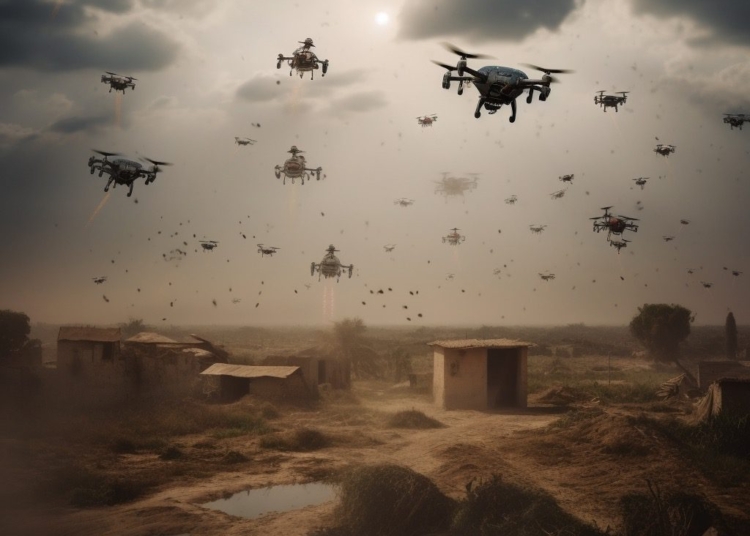In recent years, advanced technologies such as drones and artificial intelligence (AI) have been reshaping the military landscape. Drones, or unmanned aerial vehicles (UAVs), have become essential tools in modern military operations, providing surveillance, intelligence gathering, and precision strikes without risking human lives. AI systems, on the other hand, assist military commanders in decision-making by analyzing large amounts of data and providing valuable insights. These technologies come with ethical considerations, such as privacy concerns and the need for human oversight. However, they also have future implications, including potential changes in warfare strategies and international regulations. Responsible deployment of these technologies is crucial for maintaining public trust and minimizing unintended consequences.
From Drones to Artificial Intelligence: The Cutting-Edge Technologies Reshaping the Military Landscape
Introduction
In recent years, advanced technologies have been rapidly reshaping the military landscape, revolutionizing warfare as we know it. From unmanned aerial vehicles (UAVs), commonly referred to as drones, to artificial intelligence (AI), these cutting-edge technologies have introduced new dimensions to military operations. This article explores the impact of drones and AI on the modern military and discusses their potential implications for the future.
1. Drones: Changing the Face of Warfare
Drones have emerged as indispensable tools in modern military operations. These unmanned aircraft systems enable military personnel to conduct surveillance, gather intelligence, and even engage in combat without risking human lives. The ability to operate in hostile environments and navigate through obstacles with improved agility and efficiency has significantly enhanced military capabilities.
Furthermore, drones have proven their effectiveness in precision strikes. Equipped with advanced targeting systems and guided munitions, they can accurately hit targets, minimizing collateral damage and reducing the risk to civilian lives. This level of precision has changed the dynamics of warfare, providing a greater advantage to military forces.
2. Artificial Intelligence: Enhancing Decision-Making
Artificial intelligence is another groundbreaking technology shaping the military landscape. With the ability to analyze vast amounts of data, AI systems assist military commanders in making informed decisions, enabling faster response times and more effective planning. AI-powered algorithms can process information from various sensors and sources, providing valuable insights and identifying patterns that might be overlooked by human operators.
One key application of AI in the military is autonomous systems. These include unmanned ground vehicles (UGVs), autonomous robots, and even autonomous weapons systems. With the integration of AI, these systems can perform tasks and engage in combat independently. This reduces the strain on human resources, enhances operational efficiency, and allows for more rapid, accurate responses to changing battlefield conditions.
3. The Challenges and Ethical Considerations
While these cutting-edge technologies offer substantial benefits, they also present unique challenges and ethical considerations. The rise of drones raises concerns regarding privacy, as well as the potential for misuse or unintended consequences. Striking the right balance between military advantage and ethical implications remains a significant challenge.
Similarly, AI brings ethical dilemmas, especially when deploying autonomous systems. Issues such as accountability, responsibility, and the potential for unintended consequences require careful consideration. The need for human oversight and decision-making remains critical to ensure the ethical use of these technologies.
4. Future Implications
The continued development of drones and AI in the military sector has wide-ranging implications for the future. The use of drones is likely to increase, and as technology advances, they may become smaller, faster, and more autonomous. This could lead to a shift in warfare strategies and tactics, as well as potential changes in international regulations and norms.
Furthermore, AI is expected to play an increasingly significant role in military operations. The development of autonomous weapons systems has sparked debates on the limits of AI and the potential risks associated with handing over critical decisions to machines. Ensuring responsible and ethical use of AI in the military will be crucial for maintaining trust and minimizing unintended consequences.
Conclusion
The military landscape is being rapidly transformed by the emergence of cutting-edge technologies such as drones and artificial intelligence. These advancements are revolutionizing warfare, providing military forces with enhanced capabilities, better decision-making tools, and improved efficiency. However, careful considerations of the ethical implications and potential risks are necessary to ensure responsible deployment and to maintain public trust. As these technologies continue to evolve, their impact and future implications will shape military strategies and operations for years to come.












